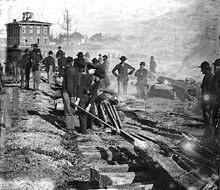The One-Year War[]
On July 19, 1870, the Franco-Prussian War began. However, this date is when the divergence begins.
The French mobilized much more quickly then in real life, and marched into Germany. Their strategy was that the cavalry would charge ahead and attack smaller targets, while the infantry and artillery would pursue the scorched-earth campaign behind, burning railroads. This meant that the Germans could not use their technological advantage. The German morale fell quickly and German civilians termed the name "blitzkrieg" to define the horrible French atrocities.

Left: The French Army's blitzkrieg strategy.
On August 2, 1870, the Battle of Trier began. The Germans had set a trap for the French. The whole German Army attacked the French cavalry. The French cavalry, which numbered around 100,000, lost a quarter of their troops on the first day, but the French generals ordered the cavalry to push on. On August 5, 1870, the infantry arrived in the night. The cavalry numbered 30,000, the infantry numbered 200,000, and the artillery numbered 100,000. The infantry charged, while the artillery bombarded Trier. Meanwhile, the cavalry rode on to Berlin again performing scorched earth.
On August 7, General Helmuth von Molke was captured, and on August 8, the following day, the Prussian army surrendered. On August 9, Napoleon III himself arrived, and the army burned Trier to the ground. The army continued on, and Moltke was sent to a prison in Corsica.
The French army and artillery advanced on South Germany. Baden, Wurttemburg, and Bavaria combined their forces at Stuttgart. On August 11, the French took Karlsruhe, again with no opposition, and burned it to the ground. On August 15, 1870, the Battle of Stuttgart began. The demoralized army surrendered on August 18, 1870. On August 21, 1870, Baden, Wurttemburg, and Bavaria applied for a truce, and they got it. A treaty began to be negotiated.
On August 25, 1870, the French cavalry finally arrived at Berlin. Meanwhile, the French army marched to Berlin from the south. On August 27, Chancellor Otto von Bismark escaped from Germany and went to Vienna, where he was captured on September 4. However, Prussia paid a ransom to Austria to let him go on September 16, and he escaped to Switzerland.
On September 24, 1870, the French main army and artillery arrived at Berlin, and the siege truly began. The siege continued on and not much happened until Christmas 1870, when the Christmas Treaty was signed in Vienna. France would annex Baden and Wurttemburg.
On February 6, 1871, Berlin surrendered. Meanwhile, France went around destroying even more infrastructure, not accepting the Prussian surrender until June 18, 1871, the fifty-fifth anniversary of the Battle of Waterloo.
On July 19, 1871, the Treaty of Copenhagen was signed. France would annex Luxembourg as well as Baden and Wurttemburg, and Prussia was forced to give up all of its land west of the Elbe River to the Second Confederation of the Rhine, which was a vassal of France, and in many ways a buffer state in Germany, and Schleswig-Holstein to Denmark.
However, Napoleon III set his sights on one more thing: Belgium. On October 6, 1871, the Treaty of Madrid was signed. Russia, Britain, Austria and the Netherlands all promised not to declare war on France if it attacked Belgium, as long as it started no other wars for the next 10 years. On December 2, 1871, the anniversary of his and his uncle's coronation, he attacked Belgium.
Napoleon III did not use blitzkrieg on Belgium, for he didn't want to be in charge of even more reconstruction. Even so, Belgium was an easy victim for France. The only place where the Belgians put up much resistance was the city of Brussels, where the whole Belgian army attacked the French army in the First Battle of Brussels on February 7. On February 9, 1872, however, King Leopold unconditionally surrendered after the battle was a victory for the French.
After the annexation of Belgium, many great powers, especially the British, worried that France was breaking the balance of power. French ambassadors around Europe gave the same news to Napoleon III. As a result, Napoleon III invited all of the countries of Europe to the Paris Conference. At the Paris Conference, the European Confederation was created, with all of the European nations except for Switzerland, which was neutral.
